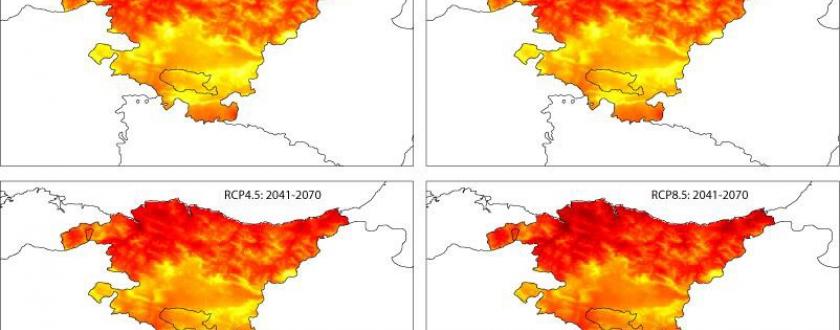High resolution climate scenarios for the Basque Country
Description of the case study
Regional climate change scenarios provide cross-cutting reference information which feeds into the design of climate change adaptation strategies in such diverse areas and sectors as construction, health, agriculture and water management, etc. Said scenarios should be used when assessing climate vulnerability and impacts and when defining climate change adaptation measures.
This project facilitates updated regional climate change scenarios for the Autonomous Community of the Basque Country (ACBC) and provides managers with reference information to inform assessments of climate change vulnerability and impacts and to assist in defining adaptation measures.
The spatial resolution of climate change scenario models—hundreds of kilometres—does not allow the heterogeneity of the area to be considered on a regional and/or comarcal scale. The high resolution scenarios developed in the Basque Country take on the challenge of developing regionalisation (down-scaling) processes to increase their resolution. Dynamic regionalisation is one of these techniques and is based on Regional Climate Models (RCM). It will facilitate higher resolution climate scenarios for different time periods in the 21st century and will contribute to improving knowledge around climate change and to making progress in identifying and assessing impacts, weaknesses and new adaptation possibilities.
The main objectives of this project are as follows:
- Update climate scenarios for the ACBC using Euro-CORDEX advances in climate simulation models for different time periods and scenarios.
- Use the indicators proposed by the ETCCDI (Expert Team on Climate Change Detection and Indices) to assess the vulnerability of the ACBC.
- Disseminate these results among public bodies with responsibility for sectoral policies and among the scientific community.
The solutions adopted in the project are as follows:
- Creation of the climate atlas for the ACBC using daily high spatial resolution data (1km x 1km) on basic variables (precipitation, average temperatures, maximum and minimum temperatures) from the period 1971-2015.
- Calculation of high spatial resolution (1km x 1km) climate change projections for the 21st century (2011-2040, 2041-2070, 2071-2100) for the RCP4.5 and RCP8.5 scenarios, using RCM simulations carried out as part of the Euro-CORDEX project.
Case study developed and implemented as a climate change adaptation measure.
Neiker-Tecnalia, Basque Meteorological Agency-Euskalmet.
Additional Information
This project has been taken forward by the public body Neiker-Tecnalia in collaboration with the Basque Meteorological Agency-Euskalmet. Given the interest in the maps and information generated by the project relative to future climate change adaptation initiatives in the Basque Country, all the information will be available to citizens, private businesses and public administrations via GeoEuskadi (Basque Spatial Data Infrastructure), the Basque Government’s FTP download service for geographical information, and the Open Data Euskadi website (open data).
Success: data at high spatial and temporal resolution; generation of ACBC-scale information which is compatible with international indicators and standards; open access to all the data for the scientific community, business sector and general population; benchmark for extending this information to other Pyrenean regions.
Limiting: need to update models as and when more precise databases are obtained; the method used does not accommodate the daily series which are a necessary part of many climate impact studies (tourism, health, etc.).
This project has been funded through “KLIMATEK: R&D, innovation and demonstration projects for climate change adaptation in 2016”, a grant funding programme of the Basque Government.
The project helps meet the objectives of the Basque KLIMA 2050 Strategy, specifically “Ensuring the resilience of the Basque region to climate change”.
2016 (1 year)
Reference information
PYRENEAN CLIMATE CHANGE OBSERVATORY
Avenida Nuestra Señora de la Victoria, 8
22.700 - Jaca
Huesca - España
+34 974 36 31 00
info_opcc@ctp.org





